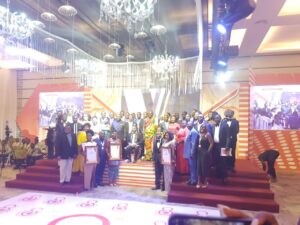
Mr. Herbert Krapa, Minister of State at the Energy Ministry, says Ghana’s streamlined regulations on local content in the energy sector has achieved the desired results.
He said streamlined regulations had created a supportive environment for local businesses to thrive through the implementation of transparent and robust local content regulations and policies.
The Minister of State said this at the 8th edition of the Ghana Energy Awards in Accra.
The 8th edition was on the theme: “the role of local content in building Ghana’s energy sector.‘’
It highlighted the local content framework of Ghana’s energy sector and its contribution to economic growth.
He said the government’s streamlined regulations in the energy sector have helped build a dynamic and competitive market, ensuring that Ghanaian companies could compete effectively globally.
Mr. Krapa said that Ghana could fully realise a self-sufficient and globally competitive energy sector through enhanced skill development and encouraging a greater share of local ownership in the country’s energy resources.
He said as African countries took bold steps to design their own energy policies, it was imperative that they placed local content at the centre of their efforts.
Mr. Krapa noted that factors including lack of technical expertise, insufficient local funding, and limited ownership of energy resources were inhibiting the African continent’s local content efforts.
The Minister said this situation had led to the over-reliance on foreign investments and expertise.
He said that while foreign collaboration had brought short-term benefits, its role in fostering sustainable and local community development must not be downplayed.
Osabarimba Kwesi Atta II, Omanhene of the Oguaa Traditional Council, called on foreign investors to collaborate with local players to drive Ghana’s local content agenda.
He said foreign investors, due to their global presence, often had the requisite experiences to navigate the complex challenges businesses face.
Omanhene emphasised that such competences could be replicated by their Ghanaian counterparts through collaboration.
Osabarimba Kwesi Atta urged foreign investors to collaborate with local players by ensuring that their investments not only bring success to their business but also create lasting benefits to the community they operated in.
He said local content participation was not a foreign concept, but it resonated deeply with the culture and traditions of the country.
Omanhene said the government must place great value on the active participation of Ghanaians in the country’s upstream and downstream sectors.
He urged the attendees to also play their part in encouraging Ghanaians participation in the country’s oil sector, noting that such a role could be realised through active engagement with the government.
“Tonight, I want to encourage all of us gathered here to be reminded of the responsibility we each bear in driving our local content agenda forward. The government has done marvellously in this regard through appropriate legislation and policies.”
“We must learn and understand these legislations and policies that push for an environment where all stakeholders, both local and foreign, are empowered to participate fully in this journey,” he said.
Various personalities and organisations received awards for their immense contribution to the sector.
Mr. Kojo Aduhene, Chief Executive Officer of LML Holdings, won the Energy Personality of the Year male category, while Nana Akua Agyei, Head of Legal at the Petroleum Commission, won the Female Energy Personality of the Year.
Mr. Samuel Dzamas, CEO of Bui Power Authority, won the CEO of the year, Power category, while Dr. Edwin Provencal, the Managing Director for BOST, won CEO of the year, Petroleum category.
Other organisations that won awards included GOIL PLC, PETROSOL Platinum Energy, and Webber Energy.
Mrs. Ama Jantuah Banful was awarded a lifetime achievement award for her role at the Ghana National Petroleum Company and other energy-led organisations.
Source: GNA



